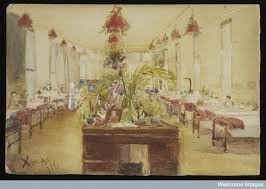
By João Eurico Cabral da Fonseca
The corridors were now dimly lit, a little wavering from the effect of the discreet Christmas ornaments next to a small nativity scene. The background noise from the monitors and infusion pumps was now more prominent in the absence of other sounds. A discreet smell of Christmas festivity mingled with the hospital odour. The visits had long ended, on a day with more family members in the ward than usual. Most patients slept, or tried to sleep, in now darkened rooms. The nurses changed shifts and with the door closed, there was only the faint sound of human voices. The medical assistants were in their office, perhaps taking a break from an activity that was always very hard. There was an atmosphere of balanced and controlled calm.
But that wasn't what the internal emergency doctor felt. Alone, for more than 12 hours and still with one night to go, he mentally went through the patients who were unstable, among the approximately 60 beds under his responsibility, in 3 sectors located on different floors. Although all the patients with minimal security conditions were discharged to spend Christmas at home and, therefore, the Service had fewer hospitalized patients than usual, those who stayed were all cases in need of essential care. Among them were clinically unstable cases that focused his attention during the day and inevitably filled the young doctor's mind. One of the cases worried him particularly. He had the perception that he wasn't getting to the cause of the problem and throughout the day he had already conferred with several colleagues from other specialties and performed all the tests he thought pertinent. He reviewed the case again in the absolute silence of the doctors' room. He analysed his notes, rethought the tests, checked the therapy and tried to tell himself that everything that had to be done had been guaranteed. Perhaps he could have talked to family members and warned them about the instability of the situation. Or even having a little chat with his boss over the phone. But the day had been too intense and he didn't remember. Now just over an hour before midnight on 24 December was certainly not the time to make these contacts.
Meanwhile, the nurses invited him to have tea and a slice of Christmas cake, which he accepted with pleasure. Those evenings always made him constantly hungry. He exchanged a few words, but before the teacup was empty, he excused himself and walked away to answer his personal phone. On the other side, he could hear the noise characteristic of a festive atmosphere. It was his family to check if everything was going well. The young children talked on the phone, excited about the gifts they had already opened. Their excitement and lack of language development drowned out much of the content of the phone call. He was inevitably left with a sense of loss and even guilt. He returned to the nurses and conveyed his concerns about the patient and the need for observation. He was now deeply tired. He lay down on the couch in the doctors' lounge and the mix of a long day and sleepless nights at home because of the children's multiple night-time complications were the perfect combination for an immediate sleep.
Then, there was a quick, intense knock at the door. "Doctor, come quickly!" He felt his characteristic tachycardia that occurred on these occasions. Coat, stethoscope, phones in pockets. He was quickly at the patient's side. She was the patient who worried him. Sitting on the bed, anxious, with difficulty breathing. The physical examination was compatible with pulmonary oedema. The nurse and the assistant looked at him apprehensively, waiting for instructions that would also lighten their own anxieties. He was quick to decide on a stream of instructions related to immediate therapy while he himself performed an EKG and collected arterial and venous blood. He was now going through an expectant phase. Repeatedly checking blood pressure, heart rate, auscultation, oxygenation, and urine output alleviated some of the anxiety of the situation and reinforced that the diagnosis and therapy were correct, with small signs of improvement appearing quickly. He began to wonder if he could have anticipated the situation before he fell asleep. He refocused on the moment, determined to ensure the patient's stability until dawn. After some time, with tests already available and the patient having stabilized, he managed to settle down a little. He continued to struggle to understand what was going on with the patient's clinical situation, but at least his mission in this internal emergency had been assured. He was now confident that he would be able to pass the case on to his colleague the next day with a reasonably calm clinical setting.
He sat in an armchair in a room next to the patient's room. The whole ward was too hot and the commotion around the patient left him sweating. He was still a little tachycardic. He couldn't help but think about the family phone call and the massive ongoing turmoil over the past 24 hours. It was hard not to wonder if this was what he really wanted out of life. To spend 24 December away from his children, slaughtered by professional responsibility. He returned to the bedside of the patient, who smiled at him, now much more relieved. He took her hand and asked her how she felt. The patient smiled again and squeezed his hand tightly. "Thank you for giving me your Christmas".
João Eurico da Fonseca
Director of the Rheumatology Service of the Centro Hospitalar Universitário Lisboa Norte
Director of the Institute of Clinical Semiotics and Full Professor at the Faculty of Medicine of the University of Lisbon
Investigator at the Institute of Molecular Medicine


